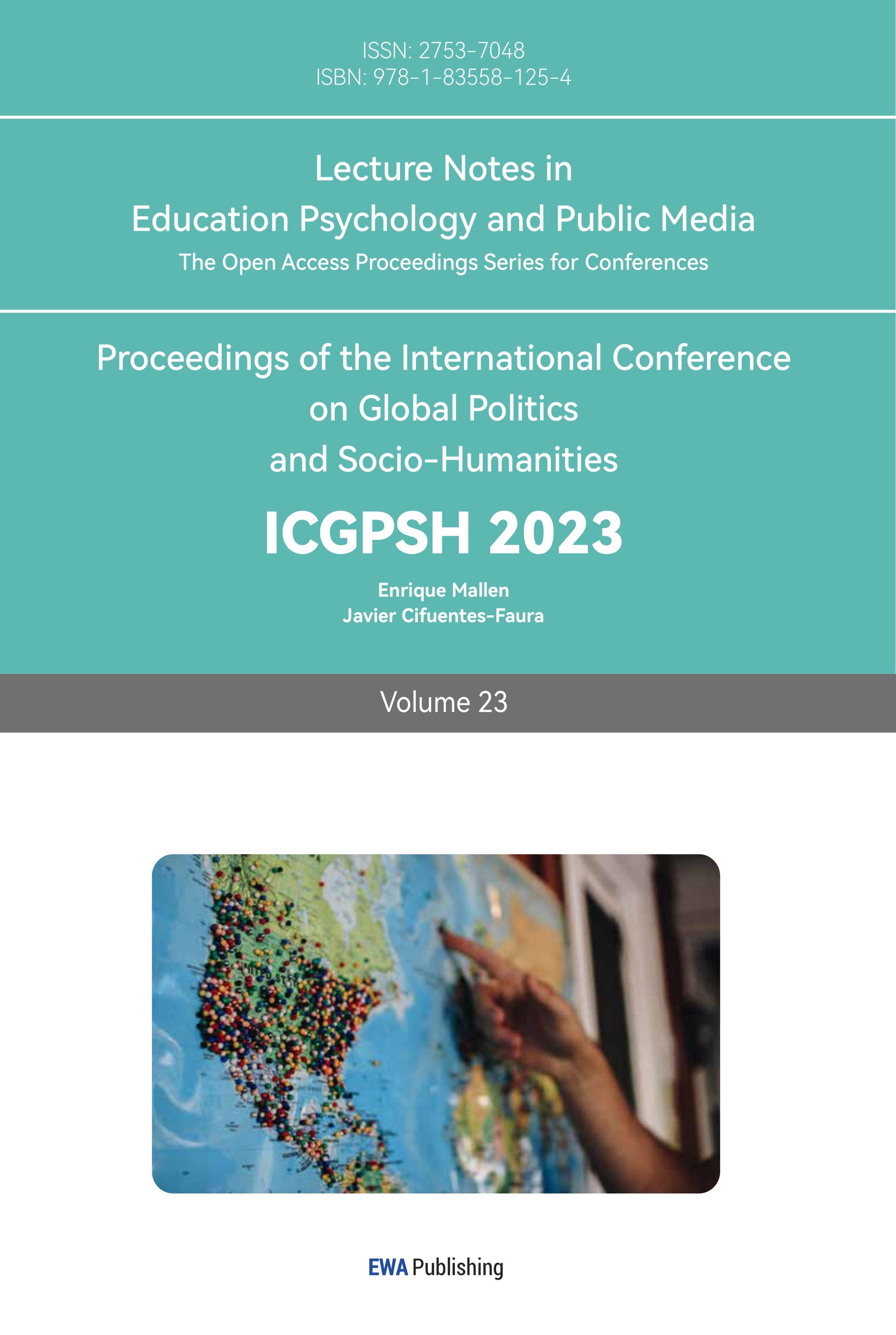References
[1]. Deng,C.M. (2021). Implications of the Affective Filter Hypothesis for English Teaching. English on Campus (15),54-55.
[2]. Li, S.L.(2011). A Brief Discussion on Anxiety and Motivation in Second Language Acquisition. Journal of Science and Education (Last Ten-Day Period).(04),54-55.
[3]. Wei, F.F. & He, H.Q. (2013). The Influence of Motivational Factors on Second Language Acquisition in Individual Differences. English Abroad (01),41-44.
[4]. Skehan, P. (1989) Individual Differences in Second Language Acquisition. London:Edward Arnold.
[5]. Aydın, G., & Michou, A. (2020). Self-determined motivation and academic buoyancy as predictors of achievement in normative settings. British Journal of Educational Psychology, 90(4), 964-980.
[6]. Dörnyei, Z. (2005). The Psychology of the Language Learner: Individual Differences in Second Language Acquisition. Mahwah: Lawrence Erlbaum Associates, Inc.
[7]. Horwitz, E. K., Horwitz, M. B. & Cope, J. (1986). Foreign language classroom anxiety. The Modern Language Journal, 70, 125-132.
[8]. Liu, Z., Yao, X.J. & Hu, S.F. (2012). Structural Analysis of Second Language self, Anxiety and Motivation Learning Behavior of College Students. Foreign Languages(06),28-37.
[9]. Taguchi, T., Magid, M., & Papi, M. (2009). The L2 motivational self system among Japanese, Chinese and Iranian learners of English: A comparative study. Motivation, language identity and the L2 self, 36, 66-97.
[10]. Oxford, R. L. (1999). Anxiety and the language learner: New insights. Affect in language learning, 58(3), 67-91.
[11]. Qin, X.Q. (2003). Quantitative Data Analysis in Foreign Language Teaching Research [M]. Wuhan: Huazhong University of Science and Technology, 37-40.
[12]. Noels, K. A. (2001). New orientations in language learning motivation: Towards a model of intrinsic, extrinsic, and integrative orientations and motivation. Motivation and second language acquisition, 23, 43-68.
[13]. Dörnyei, Z. (2009). The L2 motivational self system. Motivation, language identity and the L2 self, 36(3), 9-11.
[14]. Dörnyei, Z., & Ushioda, E. (2021). Teaching and researching motivation.
[15]. Foss, K. A., & Reitzel, A. C. (1988). A relational model for managing second language anxiety. TESOL quarterly, 22(3), 437-454.
Cite this article
Li,Y. (2023). A Study on the Effects of L2 Motivational Self System and Language Learning Anxiety on English Performance of Non-English Major Undergraduates. Lecture Notes in Education Psychology and Public Media,23,190-200.
Data availability
The datasets used and/or analyzed during the current study will be available from the authors upon reasonable request.
Disclaimer/Publisher's Note
The statements, opinions and data contained in all publications are solely those of the individual author(s) and contributor(s) and not of EWA Publishing and/or the editor(s). EWA Publishing and/or the editor(s) disclaim responsibility for any injury to people or property resulting from any ideas, methods, instructions or products referred to in the content.
About volume
Volume title: Proceedings of the International Conference on Global Politics and Socio-Humanities
© 2024 by the author(s). Licensee EWA Publishing, Oxford, UK. This article is an open access article distributed under the terms and
conditions of the Creative Commons Attribution (CC BY) license. Authors who
publish this series agree to the following terms:
1. Authors retain copyright and grant the series right of first publication with the work simultaneously licensed under a Creative Commons
Attribution License that allows others to share the work with an acknowledgment of the work's authorship and initial publication in this
series.
2. Authors are able to enter into separate, additional contractual arrangements for the non-exclusive distribution of the series's published
version of the work (e.g., post it to an institutional repository or publish it in a book), with an acknowledgment of its initial
publication in this series.
3. Authors are permitted and encouraged to post their work online (e.g., in institutional repositories or on their website) prior to and
during the submission process, as it can lead to productive exchanges, as well as earlier and greater citation of published work (See
Open access policy for details).
References
[1]. Deng,C.M. (2021). Implications of the Affective Filter Hypothesis for English Teaching. English on Campus (15),54-55.
[2]. Li, S.L.(2011). A Brief Discussion on Anxiety and Motivation in Second Language Acquisition. Journal of Science and Education (Last Ten-Day Period).(04),54-55.
[3]. Wei, F.F. & He, H.Q. (2013). The Influence of Motivational Factors on Second Language Acquisition in Individual Differences. English Abroad (01),41-44.
[4]. Skehan, P. (1989) Individual Differences in Second Language Acquisition. London:Edward Arnold.
[5]. Aydın, G., & Michou, A. (2020). Self-determined motivation and academic buoyancy as predictors of achievement in normative settings. British Journal of Educational Psychology, 90(4), 964-980.
[6]. Dörnyei, Z. (2005). The Psychology of the Language Learner: Individual Differences in Second Language Acquisition. Mahwah: Lawrence Erlbaum Associates, Inc.
[7]. Horwitz, E. K., Horwitz, M. B. & Cope, J. (1986). Foreign language classroom anxiety. The Modern Language Journal, 70, 125-132.
[8]. Liu, Z., Yao, X.J. & Hu, S.F. (2012). Structural Analysis of Second Language self, Anxiety and Motivation Learning Behavior of College Students. Foreign Languages(06),28-37.
[9]. Taguchi, T., Magid, M., & Papi, M. (2009). The L2 motivational self system among Japanese, Chinese and Iranian learners of English: A comparative study. Motivation, language identity and the L2 self, 36, 66-97.
[10]. Oxford, R. L. (1999). Anxiety and the language learner: New insights. Affect in language learning, 58(3), 67-91.
[11]. Qin, X.Q. (2003). Quantitative Data Analysis in Foreign Language Teaching Research [M]. Wuhan: Huazhong University of Science and Technology, 37-40.
[12]. Noels, K. A. (2001). New orientations in language learning motivation: Towards a model of intrinsic, extrinsic, and integrative orientations and motivation. Motivation and second language acquisition, 23, 43-68.
[13]. Dörnyei, Z. (2009). The L2 motivational self system. Motivation, language identity and the L2 self, 36(3), 9-11.
[14]. Dörnyei, Z., & Ushioda, E. (2021). Teaching and researching motivation.
[15]. Foss, K. A., & Reitzel, A. C. (1988). A relational model for managing second language anxiety. TESOL quarterly, 22(3), 437-454.









